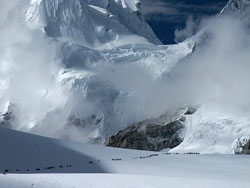|
|
So many Tibetan refugees have been fleeing to India via Nepal for so long that their crossing is accepted as something normal-until a day like 30 September, when a group of 70 would-be refugees was fired at by Chinese border guards while trying to cross into Nepal over the angpa La in the Cho Oyu region (pictured, file photo).
"They started shooting and we ran. It was around 8AM. There were 15 small children aged 8-10, only one escaped and the rest were arrested," a monk from Tibet's Gyamda county told website phayul.com.
"I think the soldiers fired for about 15 minutes," he added. "They were shouting, probably warning us, but I did not hear them as I was terrified, I just heard gunshots passing my ears . the nun was with us and she was shot and a boy from Kandze was shot in the leg."
The monk and 40 others who fled arrived in Kathmandu late Monday accompanied by an official from the UN's High Commissioner for Refugees.
The nun, a 17-year-old according to phayul.com, died in the incident. Climbers at Cho Oyu advance base camp reported seeing as many as eight people killed, but these reports are unconfirmed.
Although such shootings are relatively rare, abuse of Tibetan refugees is common, much of it at the hands of Nepali border guards, says a new report.
Two years ago, researchers interviewed 50 refugees staying at the refugee reception centre in Kathmandu about their trips from Tibet to the capital. On average they travelled 34 days, both by foot and by bus. Most carried little food for fear of arousing suspicion and had to go hungry for days or resort to begging when their supplies ran out, says the report 'Dangerous Journey: Documenting the Experience of Tibetan Refugees', published in the November issue of the American Journal of Public Health.
Although two refugees caught by Chinese border guards experienced the most severe treatment, \'one of the findings of most concern in our study was the treatment of refugees by the Nepali border guards. We documented beatings, torture, and sexual assaults at gunpoint,\' says the report.
Three women \'were separated from their groups and, despite attempts to escape, were captured. The women were taken to an outside area where a group of six guards disrobed them and sexually assaulted them at gunpoint,\' adds the document.
All of the refugees who met Nepali border guards were threatened with refoulement (being forcibly returned to China). Others ran into Maoists. They \'experienced extortion or detainment. When they were able to pay the required amounts to the rebels, they received Maoist passes and were allowed to proceed,\' says the report, whose authors include Edward J Mills, of McMaster University in Hamilton, Canada.
\'The longterm impacts of such dangerous circumstances are having a large impact on the physical and mental suffering of refugees,\' he told us via email.
The report recommends that the Tibetan government in exile in Dharamsala start providing care programs for all refugees, not only political asylum seekers, including special programs for children.



